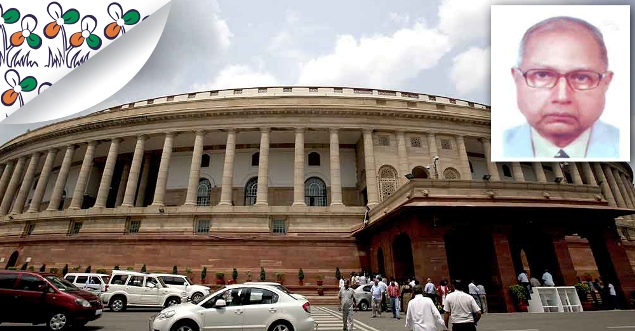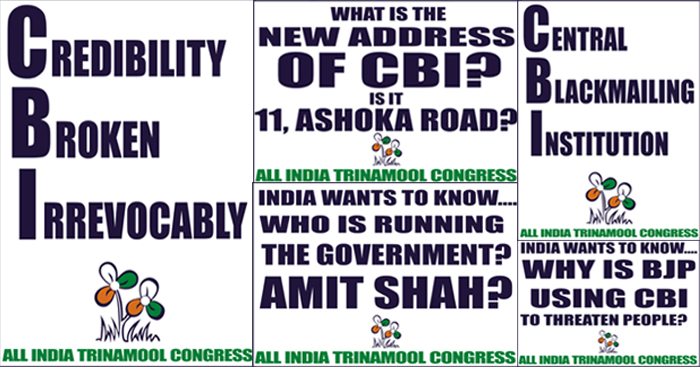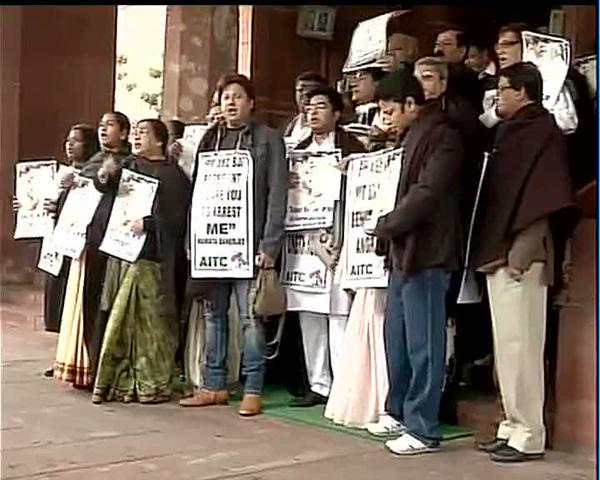Trinamool MP Sukhendu Sekhar Ray spoke in the Rajya Sabha on the prevailing agrarian crisis in India.
Here is the full transcript of his speech:
We are discussing a very serious issue. Although it was discussed on several occasions in the past and successive governments from time to time took some measures to address the crisis, we are still confronted with the crisis in a manner that some more efforts are required from the Government to address the problem.
Sir, I will not take much of your time. There is a widespread perception that an unbearable burden of debt and increased competition from imports are symptomatic of the crisis in Indian agriculture. Both these phenomena are real. Inability to bear debts has led to farmers’ suicides on an unprecedented scale; I will refer to the suicide figures later on. Import liberalisation has had a strong dampening effect on the prices of several crops, specially plantation crops. This has caused considerable distress in regions where they are prominent in the farming community.
Sir, there are two reasons to be concerned with, that indicate that Indian agriculture may face a wider and a deeper crisis:
1. The long-term growth trend in the production and the productivity of agriculture are considerably less than what are required to sustain the high overall growth rate. In the coming decade, they may actually slow down.
2. The growing economic and social disparities between agriculture and the rest of the economy, and that between the rural and the urban sectors.
We have forgotten that about 70% of our population live in rural areas. Many years back, Gandhi ji said that India lives in villages. This is still the reality today; about 833 million people, that is, 70% of the total population, live in villages.
Sir, I am quoting some important reports: a Lancet study made by researchers from London School of Hygiene and Tropical Medicine, and other studies made by the Department of Sociology of Cambridge University and the Department of Political Science of University College, London. Huge variations in suicide rates between Indian States can largely be accounted for by distinguishing between the suicides by farmers and by agricultural labourers. This is the overall assessment of the studies made by different universities across the world. These studies also say, and I quote,
“Farmers at highest risk have three characteristics,
1. Those that grow cash crops such as cotton, coffee and jute
2. Marginal farmers owning less than one hectare of land, and
3. Those with debt of more than Rs 500.”
These are the three areas that they have identified to be the cause for the rampant suicide by farmers.
Sir, the study also says that a large proportion of these rural inhabitants have not benefited from the economic growth in the past 20 years. We keep beating the drums of economic growth, but no benefit from the economic growth has gone to the kitty of farmers or the rural people of India, and this is the hard reality.
Sir, in fact liberalisation has brought about a crisis in the agricultural sector, a crisis that has entrapped many small-scale cash-strapped farmers and in some cases, has led them to suicide. We are aware of the notorious company, Monsanto which created havoc in the Vidharba region of Maharashtra. Bt cotton, GM crops and pesticides… and there is also a film about these, a documentary by the world-famous documentary film director, Micha Peled, which has won more than hundred international awards in various film festivals. I can arrange a special show for the Hon’ble members of this august House. The day I saw it, I could not stand the shock and trauma that are being inflicted upon the cotton farmers of Maharashtra; it is not only shocking, but also inhuman.
The title of a New York University School of Law report on Monsanto said, ‘Either mankind will stop Monsanto or Monsanto will stop mankind.’ This is how horrible the situation is. I am indebted to the brothers and sisters of Swadeshi Jagaran Manch; they raised a protest and as a result, the Government has not started the trial of GM crops, so far my knowledge goes. If the Government is still sticking to its earlier decision of GM crop trials, it should be opposed, tooth and nail, by all patriots and nationalists.
Now my next point, Sir. If we look at the suicides by farmers due to agrarian distress in 2014, the State of Maharashtra is heading the list. This year, from January to April, there were 204 cases of suicides by farmers in Maharashtra alone. What about May, June, July, August, September, October – no figure has yet been released by the Government, for reasons better known to the Government.
What about last year? Four hundred and seven in 12 months. The figure was 204 in just the first four months of this year. Next Telangana, 69 upto October, Karnataka, 19 upto mid-November, Gujarat, only 3, Kerala, only 3, Andhra, only 3 from June to October. So these are the comparative figures. I am not going to 2011 and 2012; what is past is past, but this is an alarming situation. The Government must address this situation in a befitting manner.
Sir, I also come from an agricultural state, West Bengal. In West Bengal we are trying to help our farmers in a manner so that they can earn their livelihood or at least they can maintain a minimum standard. We are trying our level-best to provide some inputs. Cumulative figures of farmers’ household incomes from my State have shown an increase of 39.64% between 2011 and 2013.
In the year 2011, my Government came to power led by Ms Mamata Banerjee. Within two years, there has been an increase of 39.64% in the income of farmers’ households and so far as the cumulative figures for the quantity of food grains produced is concerned, there has been an increase by 8.54%.
Cumulative figures for the amount of state expenditure out of the State Budget has also increased. We have increased the budget for agriculture by 59.52%. Production of cereals have increased from 148 lakh tonnes in 2010-11 to 173 lakh tonnes in 2013-14.
The other areas where we are also helping the farmers include:
- distribution of farm equipment
- crop insurance (15 horticultural crops have also been brought under the purview of crop insurance)
- support to marginal farmers (about 50,000 marginal farmers have been given monetary support)
- Rs 5,000 each for purchasing small equipments as per their choice
- pension for farmers (about 66,700 farmers have been brought under the purview of old-age pension network), and
- Brihat Krishak Bazaar (set up in different parts of the State)
In this way we are trying to help the farming community of our State. I appeal to the Government of India, personally to the Hon’ble Minister for Agriculture, that serious efforts be made by the Government of India to, firstly, combat the suicides by farmers without further loss of time and secondly, take comprehensive measures to ensure that agrarian crisis is not discussed time and again.
Thank You, Sir.






